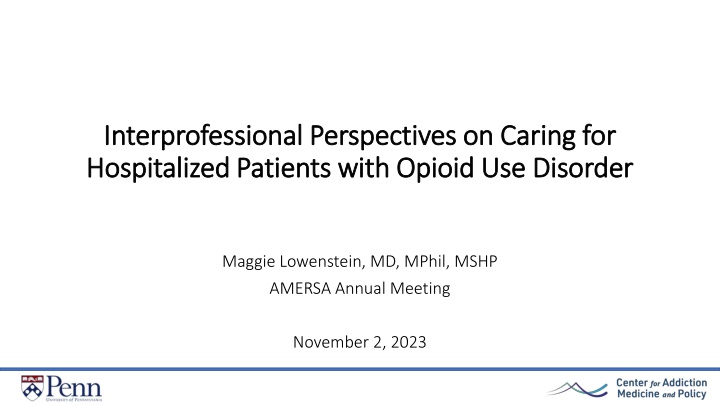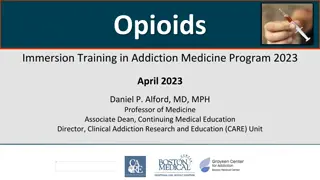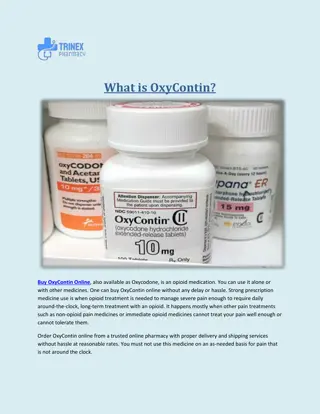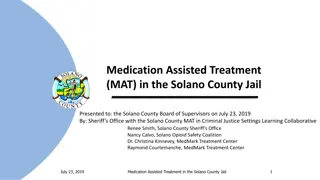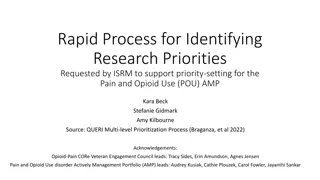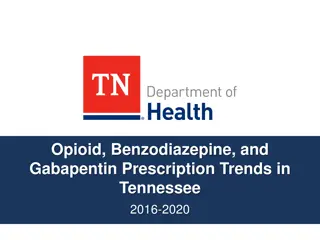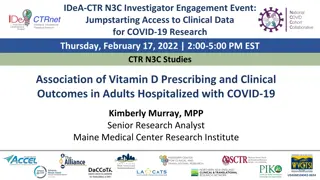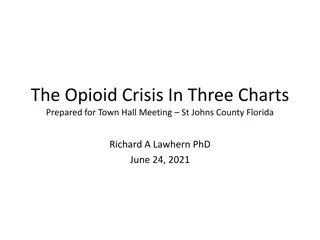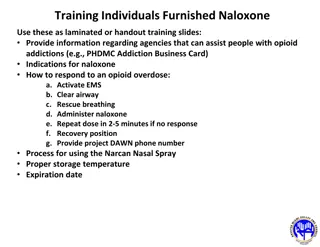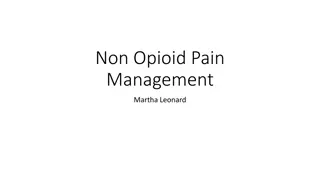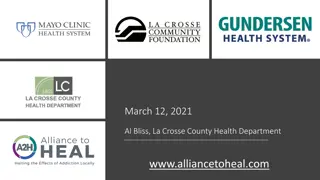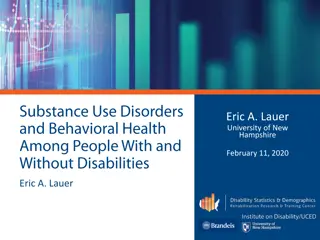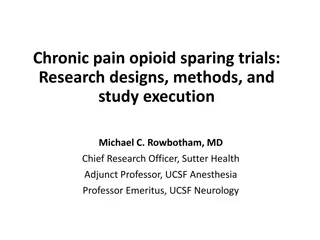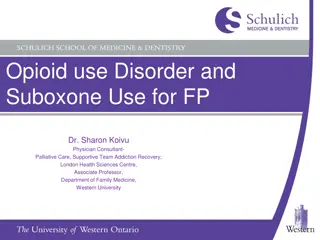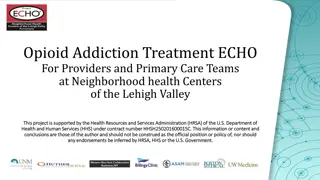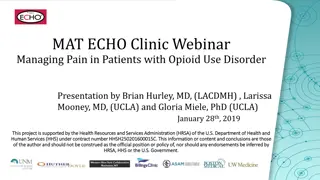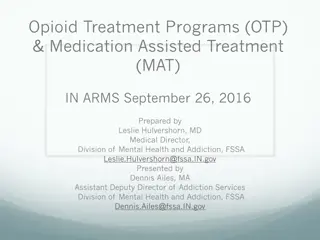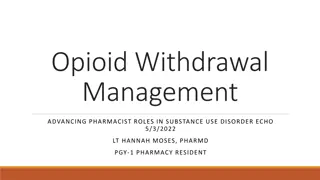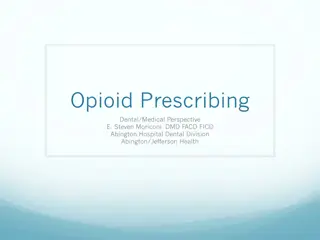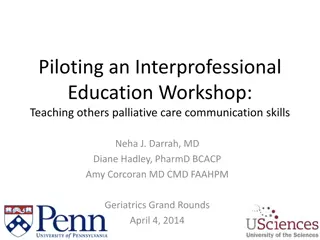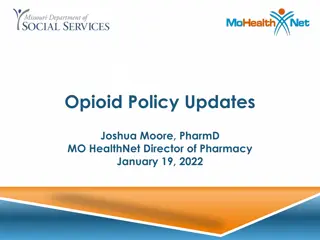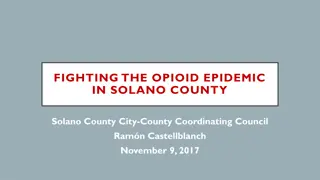Interprofessional Perspectives on Caring for Hospitalized Patients with Opioid Use Disorder
Hospitalizations related to Opioid Use Disorder (OUD) are increasing and have high rates of discharge before medically advised. Hospitalization serves as a critical touchpoint for addiction care, with ongoing efforts to enhance care during and after hospitalization through interviews with healthcare team members.
Download Presentation

Please find below an Image/Link to download the presentation.
The content on the website is provided AS IS for your information and personal use only. It may not be sold, licensed, or shared on other websites without obtaining consent from the author.If you encounter any issues during the download, it is possible that the publisher has removed the file from their server.
You are allowed to download the files provided on this website for personal or commercial use, subject to the condition that they are used lawfully. All files are the property of their respective owners.
The content on the website is provided AS IS for your information and personal use only. It may not be sold, licensed, or shared on other websites without obtaining consent from the author.
E N D
Presentation Transcript
Interprofessional Perspectives on Caring for Interprofessional Perspectives on Caring for Hospitalized Patients with Opioid Use Disorder Hospitalized Patients with Opioid Use Disorder Maggie Lowenstein, MD, MPhil, MSHP AMERSA Annual Meeting November 2, 2023
Hospitalizations Related to OUD Hospitalizations Related to OUD Are increasing Are associated with increasing morbidity, mortality, and costs Have high rates of discharge before medically advised Singh, 2020; Capizzi, 2020; Coyle, 2020; McCarthy, 2020;Thakrar, unpublished
Hospitalization as a reachable moment Hospitalization as a reachable moment Hospitalization is a critical touchpoint for addiction care Growing number of models to support hospital-based addiction treatment Ongoing work to understand best practices D Onofrio, 2015; Liebschutz, 2016; Englander, 2018; French, 2022
Study Aim Study Aim To explore perspectives of interprofessional team members on improving care for patients with OUD during and after hospitalization.
Methods Methods Semi-structured interviews with physicians, nurses, social workers Single urban, academic hospital in Philadelphia without ACS Conducted between 12/2022-3/2023 Focused on barriers and facilitators to care in the hospital and discharge planning Thematic content analysis
Participant Characteristics (n=25) Participant Characteristics (n=25) Age, mean years (sd) Female Gender, n (%) Race, n (%) White Asian Black/AA Hispanic Ethnicity, n (%) Professional Role, n (%) Nurse Attending Physician Resident Physician SW/CM APP 37.6 (9.2) 20 (80%) 14 (56%) 6 (24%) 5 (20%) 1 (4%) 8 (32%) 7 (28%) 5 (20%) 4 (16%) 1 (4%)
Key Themes Key Themes Providers + Staff Patient outcomes Staff moral distress System Level Patient Needs
Patient Level Patient Level Severity of pain and withdrawal; medical complexity The pain and withdrawal piece of it definitely comes up The pain and withdrawal piece of it definitely comes up as a big challenge as a big challenge I m seeing patients for detox and withdrawal but also cellulitis, wound infections - the very real physical manifestations of long-standing SUDs. And with that comes a lot of acute pain. T Treating acute pain while initiating or maintaining someone on acute pain while initiating or maintaining someone on M MOUDs can be very difficult. OUDs can be very difficult. reating Resident Physician
Provider and Staff Level Provider and Staff Level Gaps in knowledge and comfort We re behind. Fentanyl, xylazine these are all things that have happened quickly here and we are just learning on the job. So it s hard to know if we don t know, right. It s hard to know what to do if you don t It s hard to know what to do if you don t know. know. Attending Physician
System Level System Level Mismatch Between Needs and Existing Resources So one thing that comes up is that inpatient substance use rehab facilities often can t take care of many use rehab facilities often can t take care of many medical problems medical problems. And so if a patient has, for example, wound care that they need to be performed, there s very few facilities that will take those patients. inpatient substance Resident Physician
System Level System Level Limited support for social determinants of health People think we re going to find a house for them. And I m like, no, it just doesn t really work. We can t keep people for that long to do that type of stuff. That stuff takes months. So usually we send them somewhere and So usually we send them somewhere and they re still homeless they re still homeless. Registered Nurse
Impacts on Patients and Staff Impacts on Patients and Staff Poor patient outcomes, moral distress among staff It's hard when someone's withdrawing They don't feel good . There's only so much you can do, and people end up leaving. So it's hard because then you're like begging them to stay but you're not doing anything begging them to stay but you're not doing anything that's beneficial to them. that's beneficial to them. you're like Registered Nurse
Study Limitations Study Limitations Single hospital and single city Social desirability bias
Equity Equity Study participants Perspectives from Interprofessional care team members
Conclusions Conclusions Interprofessional hospital staff identified barriers to care for patients with OUD at the patient, provider/staff patient, provider/staff, and system Consequences included poor patient outcomes and staff moral distress. system levels. 16
Implications Implications Improvements in addiction systems and services critical to improve patient outcomes Workforce issues increasingly salient among hospital leadership 17
Acknowledgements Acknowledgements Research Team Research Team Funding Funding NIDA K23DA055087 LDI-Penn Medicine Research Lab M Holliday-Davis, MA Hons Lilah Lesniak, BA David S. Mandell, ScD Judy A Shea, PhD Jeanmarie Perrone, MD Judy Chertok, MD Ashish Thakrar, MD, MSHP Shoshi Aronowitz, PhD, MSHP 18
Questions? Questions? margaw@pennmedicine.upenn.edu @mlowenstein 19
Key Themes Key Themes Providers + Staff Inadequate knowledge and training Discomfort with addiction care Patient outcomes Staff moral Injury System Level Lack of system approach Mismatch between patient needs + available services Patient Needs Severity of pain and withdrawal Medical, psych, social complexity
Poor Patient Outcomes Poor Patient Outcomes Like nine times out of ten they leave AMA Like nine times out of ten they leave AMA, and it s a shame because they need help and they wanted help and they came to the hospital and they did everything they were supposed to do and then we failed them. Attending Physician
